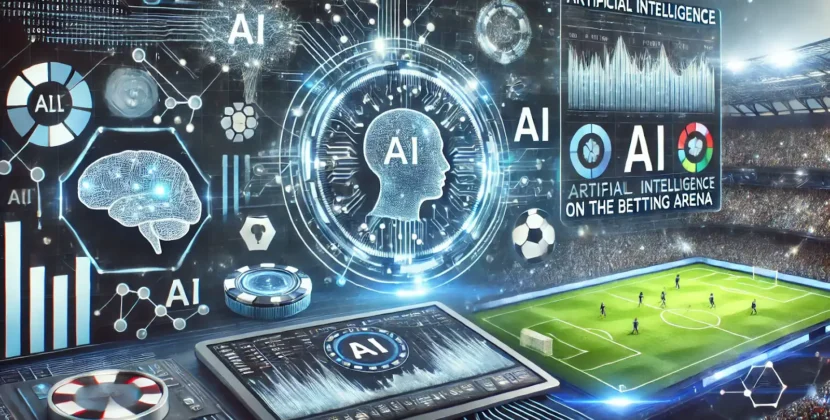
Share:
Sports betting, a multi-billion-dollar industry, has long been driven by human intuition and statistical analysis.
However, with the rise of artificial intelligence (AI), the landscape of sports betting is undergoing a profound transformation.
AI’s ability to process massive amounts of data, detect complex patterns, and make predictions with high accuracy has opened up new possibilities for bettors, sportsbooks, and the broader gambling industry.
This article explores the ways AI is reshaping sports betting, improving the accuracy of predictions, enhancing the betting experience, and creating more dynamic, secure platforms.
1. Data Analysis and Pattern Recognition: The Power of AI in Processing Big Data
One of the key ways AI is revolutionizing sports betting is through its ability to process and analyze vast datasets far beyond the capacity of human analysts.
In traditional sports betting, experts would often rely on basic historical data, player statistics, and personal insights to predict game outcomes.
AI, however, can take this data to the next level by incorporating and analyzing a multitude of variables that may otherwise go unnoticed.
AI systems utilize machine learning (ML) and deep learning algorithms to analyze enormous volumes of data, including historical game results, player performance metrics, weather patterns, injury reports, and even social media sentiment.
These algorithms are trained to detect subtle patterns and correlations in this data, leading to more accurate predictions.
Example:
AI models can examine years of data to understand how a team performs under various conditions.
For instance, it could analyze how a team’s performance changes when playing at home versus away or their outcomes following long breaks between games.
These insights, which are more detailed and nuanced than those derived from traditional statistics, provide bettors with a more sophisticated understanding of team dynamics.
2. Real-Time Betting and Dynamic Odds Adjustment
Another significant advancement AI has introduced to the sports
betting world is the ability to adjust betting odds in real time.Traditionally, odds were set before the game began and were only adjusted in response to major, predictable events (e.g., a key player injury or a weather delay).
AI, however, enables sportsbooks to continuously update odds during a game based on live data.
AI can monitor a variety of live factors—player performance, injury reports, team dynamics, and even crowd sentiment—to adjust betting odds on the fly.
This constant stream of data analysis ensures that the odds always reflect the most up-to-date information, allowing sportsbooks to manage their risk and ensure fair, competitive odds for bettors.
Example:
During a basketball game, an AI system might update the odds instantly based on events such as a player’s injury, the number of fouls committed, or the momentum shift in the game.
Such dynamic adjustments make real-time betting much more engaging and accurate, giving bettors a greater edge by aligning the odds with the ongoing developments in the game.
3. Predictive Modeling: Forecasting the Future of Sports
AI-driven predictive models have brought unprecedented accuracy to the forecasting of sports outcomes.
These models use sophisticated algorithms like regression analysis, decision trees, and neural networks to predict the results of games based on a wide range of factors.
As the model ingests more data and outcomes, it continues to learn and improve, thus refining its predictions over time.
Predictive models can consider not just statistical data, but also psychological factors, such as how a player performs under pressure or how a team reacts to different game scenarios.
Over time, these models become increasingly accurate, enabling sportsbooks and bettors to make informed decisions based on predictions that were once unthinkable.
Example:
A predictive model could analyze a team’s performance, player statistics, and even player psychology (e.g., a player’s performance in high-pressure situations) to predict the probability of a team winning or the final score of a game.
By incorporating so many variables, AI can make more precise predictions than traditional methods.
4. Personalized Betting Experience: Tailored for the Individual Bettor
AI is also transforming the user experience in sports betting by enabling personalized betting recommendations.
By analyzing an individual bettor’s historical behavior and preferences, AI can suggest bets that align with their unique risk tolerance and interests.
This level of personalization makes sports betting more engaging, as it offers users a tailored experience based on their past behavior.
For example, AI can observe patterns in the types of bets a user places—whether they prefer underdog bets or high-risk/high-reward wagers—and use this data to highlight similar opportunities in upcoming games.
This not only makes the experience more enjoyable for bettors but also increases the likelihood of ongoing engagement with the platform.
Example:
If a bettor frequently places bets on underdog teams, the AI system can prioritize highlighting similar underdog opportunities in upcoming events.
This personalized approach ensures that the user receives relevant and tailored recommendations that align with their betting preferences.
5. Fraud Detection and Prevention: Enhancing Security in Betting
Fraud detection is another critical area where AI is playing a transformative role.
In an industry where large sums of money are constantly wagered, ensuring fairness and preventing fraudulent activity is paramount.
AI excels at monitoring betting patterns and detecting any irregularities that might signal fraudulent behavior, such as match-fixing, insider betting, or other forms of cheating.
AI algorithms continuously monitor betting activity in real time, flagging unusual betting patterns that may indicate suspicious behavior.
If a sudden, inexplicable surge of bets is placed on a particular outcome just before a game starts, for example, AI can alert sportsbooks to potential insider information or match-fixing.
Example:
AI systems can track the behavior of bettors and identify anomalies such as an unusually large number of bets placed on a specific outcome right before a game begins.
These flagged activities prompt further investigation, potentially uncovering fraudulent behavior and protecting the integrity of the betting process.
6. E-sports Betting: The Intersection of AI and Gaming
With the rise of e-sports, AI is also having a profound impact on betting in the digital gaming world.
E-sports betting introduces unique challenges because of the fast-paced, dynamic nature of the games involved.
However, AI is perfectly equipped to handle this challenge, as it can analyze in-game data in real time and predict outcomes with remarkable accuracy.
AI can track detailed data from games like Dota 2, League of Legends, or Counter-Strike: Global Offensive (CS), analyzing the performance of players, the strategies employed by teams, and the evolving state of the game.
This real-time data can be used to make accurate predictions about the likely outcome of a match, giving bettors an edge in placing their wagers.
Example:
In a live Dota 2 match, AI can analyze real-time game data, including player performance, team compositions, and ongoing developments, to predict the most likely outcome.
This constant analysis makes e-sports betting more dynamic and engaging for participants, while also providing sportsbooks with the tools they need to set competitive odds.
Conclusion: The Future of Sports Betting with AI
Artificial intelligence has firmly established itself as a transformative force in the sports betting industry.
From its ability to process vast datasets and detect complex patterns to its role in real-time odds adjustments and fraud detection, AI is shaping the future of this industry.
Bettors can now make more informed decisions, while sportsbooks can offer more competitive odds, enhance personalization, and ensure greater security.
As AI technology continues to evolve, its impact on sports betting is expected to grow, making the industry more dynamic, engaging, and accessible to a broader range of bettors.
By integrating AI into their platforms, both bettors and sportsbooks stand to benefit from a more advanced, personalized, and secure sports betting experience.
Whether it’s through predictive modeling, personalized recommendations, or real-time odds adjustments, AI is setting the stage for a new era in sports betting.















